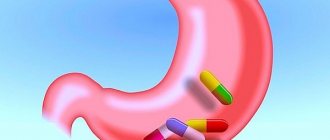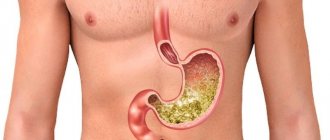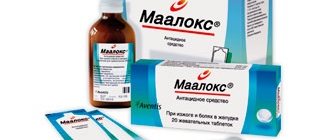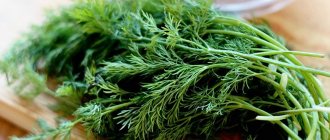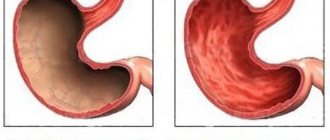The digestion process begins in the oral cavity and ends in the small intestine: in both places the environment is neutral and has a pH of 6-7. But in the stomach, the environment is very acidic due to the presence of hydrochloric acid, without which it is impossible to break down and disinfect food, so a pH of 1-3 in this part of the digestive tract is normal. How can you tell if your stomach acidity is normal? If there are no unpleasant symptoms from the gastrointestinal tract, then everything is fine. It only makes sense to influence the production of hydrochloric acid if you constantly feel discomfort. It is important to distinguish between how high and low acidity manifests itself.
How does high stomach acid manifest itself?
A patient who produces excess hydrochloric acid experiences the following symptoms:
- Heartburn is the main symptom. The acidic contents of the stomach are thrown into the esophagus, and the person experiences a burning sensation in the epigastric region - in other words, in the chest
- Belching sour
- Feeling of heaviness in the stomach after eating even a small amount of food
- Paroxysmal pain in the abdomen and right hypochondrium
As a rule, increased acidity accompanies the following gastrointestinal diseases (they are called acid-dependent):
- Gastroesophageal reflux disease (GERD)
- Gastritis with high acidity
- NSAID-associated gastropathy
- Peptic ulcer of the stomach and/or duodenum
- Zollinger-Ellison syndrome
Therapeutic therapy for such diseases should include drugs to reduce the production of hydrochloric acid (PPIs, antacids, histamine H2 receptor blockers) and to restore and protect the mucous membrane of the gastrointestinal tract (rebamipide). These medications help the mucous membrane to heal - only then will the unpleasant symptoms subside.
Reasons for the problem
The main reasons for decreased acidity are:
- heredity factor;
- metabolic disorders caused by decreased production of thyroid hormones;
- infection with fungal toxins or Helicobacter pylori;
- deficiency of zinc and a number of B vitamins;
- improper diet;
- alcohol abuse and smoking, leading to oxygen starvation of mucosal tissues;
- development of autoimmune gastritis;
- activation of the nerve receptors of the stomach by reflex effects coming from the gallbladder, as well as the female genital organs.
Foods with a predominance of carbohydrates are a weak secretion stimulant. A long-term carbohydrate diet causes a decrease in both acidity and digestive ability of juice.
The digestive ability of gastric secretions in relation to foods with excess fat is lower than meat foods, but higher than carbohydrate foods.
A decrease in acidity can be both a cause and a consequence of inflammatory processes occurring in the thickness of its walls.
The number of cells that secrete acid (and therefore determine the overall acidity of the secretion) is regulated by many hormones secreted by endocrine cells of the stomach. The acid-base balance inside the stomach is maintained, among other things, by the alkaline components of gastric juice (otherwise the stomach would digest itself) and the secretion of mucus by the gastric walls.
Thus, one of the following circumstances leads to a decrease in acidity:
- a decrease in the number of cells producing acid (up to the complete cessation of its secretion by achylia) against the background of normal secretion of the alkaline component of the juice;
- an increase in the concentration of the alkaline component of gastric secretion with normal general acidity of gastric juice;
- an increase in the concentration of alkaline components against the background of a decrease in the number of cells producing hydrochloric acid.
Under normal conditions, the amount of secretion depends on the degree of homogeneity (consistency) and volume of the food mass found in the stomach (the more food, the more intense the secretion).
I don't know anyone who hasn't felt heartburn at least once in their life. According to the laws of common sense, the assumption arises that there is too much acid in the stomach.
It is thrown into the esophagus and damages it. Right? But no.
Along with the myth about cholesterol, the myth about hydrochloric acid is one of the most common. There is nothing surprising about this.
The fact is that drugs that reduce stomach acidity are a cash cow for pharmaceutical companies. The cost of milk production from this ladybug is estimated at $13 billion per year.
Moreover, her milk yield is second only to the record of the anti-cholesterol Burenka.
Believe it or not, hydrochloric acid is found in the stomach for more than just punishment for eating spicy or sour foods. Hydrochloric acid must be present in the stomach. And if it is necessary for life, it is therefore important for health. Thanks to pharmaceutical companies, most heartburn sufferers have no idea how important hydrochloric acid is for digestion and overall health.
The first thing your doctor will recommend is lifestyle changes. Medicines used to treat heartburn at home:
- Antacids.
- H3-histamine receptor blockers.
- Proton pump inhibitors.
- Prokinetic agents.
In some cases, anti-reflux surgery is the best option. Due to the effectiveness of medications, surgery is not a primary treatment option. It is used if a patient cannot afford long-term medication or the doctor determines that the medication has not been effective. The medical specialist will also recommend surgery if there is a complication:
- Large hiatal hernia.
- Severe esophagitis, especially with bleeding.
- Repeated narrowing (stricture) of the esophagus.
- Barrett's esophagus, especially with advanced precancerous or cancerous changes.
- Severe pulmonary problems due to heartburn, acid reflux - bronchitis, pneumonia.
The most common minimally invasive surgery procedure is the Nissen fundoplication. It is done using laparoscopic surgery and involves a hospital stay.
Heartburn is one of the most common complaints with which stomach patients consult a doctor. Most people still try to get rid of heartburn on their own at home, which is not very correct. Considering that the doctor most often simply prescribes a medicine that reduces acidity, it makes sense to talk about this problem in more detail.
The same incorrect eating habits can lead to both heartburn and high acidity:
- Combine incompatible foods in one meal - for example, meat and fish, dairy products and meat, etc.
- Overeat. Do not overload the stomach; It’s better to eat more often, but little by little.
- After meals, eat fatty desserts, as well as desserts made from dairy products and/or with sugar; they interfere with the digestion of food and contribute to weight gain. It is better to eat desserts some time after breakfast or lunch.
- There are citrus fruits for dessert. Acids are poorly absorbed after eating; It’s better to eat an apple or pear and leave the citrus fruits for the morning.
- Eating too quickly without chewing food.
- Drink plenty of water during meals. It is better to drink water half an hour before meals and some time after meals.
- Eating in a state of stress, anxiety or irritation. We should try to eat in a calm state, in a pleasant environment, without doing other things and avoiding companies that unbalance us.
- Taking antacids for a long time can change the pH of our stomach.
How does low stomach acid manifest itself?
Low stomach acidity is much less common than high acidity. As candidate of medical sciences, gastroenterologist Sergei Vyalov writes on his Instagram, only one out of 10 patients with real gastritis has low acidity.
Symptoms of low stomach acid:
- flatulence, bloating
- abdominal pain
- constipation
- putrid breath
Low acidity is just as unsafe as high acidity: it accompanies hypoacid (atrophic) gastritis and gastroduodenitis. Due to a lack of hydrochloric acid, food in the stomach is poorly “disinfected,” which means that pathogenic bacteria, viruses and toxins have the opportunity to penetrate further into the intestines. In the stomach, for the same reason, the pathogenic Helicobacter pylori begins to “bloom wildly.” That is why atrophic gastritis is called the leading risk factor for stomach cancer.
– The lower the pH, the higher the risk of Helicobacter pylori infection, the causative agent of stomach ulcers. H. Pylori bacteria must neutralize hydrochloric acid in order to survive in the stomach. If you help her do this with an overly alkaline diet, the bacteria multiplies faster. In turn, H. Pylori causes atrophic gastritis: it destroys the glands that produce the components of gastric juice. This bacterium increases the risk of developing stomach cancer,” Dr. Vyalov told Meddaily.
Treatment
Treatment begins with a special diet
Unfortunately, hypoacid gastritis is much more difficult to treat than ordinary forms. If patients experience an exacerbation of their condition, they are referred for inpatient treatment. Patients receive mainly symptomatic therapy: antispasmodics, alkaline gastric and esophageal lavages.
Patients receive a special diet that excludes the consumption of rough, spicy or fatty foods. Meals are shown in fractional amounts - many times a day in small portions. Mineral waters with an alkaline composition are used. The main difference is that such patients do not receive proton pump blockers and H2 histamine blockers, the use of which can lead to the development of anacid conditions.
Next article in this section: Causes and treatment of severe heartburn attacks Did you like the article? Share with friends! Rate this article
Probably every person has at least once experienced a burning sensation in the chest, bitterness in the mouth, belching, pain in the peritoneum, which indicates improper functioning of the digestive system. However, is heartburn increased or decreased acidity? It appears in a person soon after eating, bending sharply, or playing sports.
Content
What to do if you suspect changes in acidity
If you constantly (for at least 3-4 weeks) experience one or more of the listed symptoms, you should definitely contact a gastroenterologist. In addition to the standard set of tests (blood test, stool test, ultrasound of the abdominal organs, gastroscopy), it is necessary to do a study of the acidity of the gastric contents. Intragastric pH-metry is considered the most informative method; urine staining and fractional sounding are the least informative.
– There is no need to fight stomach acidity if it is normal. After a few years, this can lead to serious illnesses. If atrophic changes have already begun, it is necessary to suppress H. Pylori with antibiotics and treat atrophy with drugs based on rebamipide. Diet is only an auxiliary, and not the main means of combating diseases of the gastrointestinal tract. It reduces symptoms, but does not cure pathological processes on its own, advises Sergei Vyalov.
Diseases with altered acidity
Almost any disease of the upper digestive system is accompanied by a change in pH levels. How to understand heartburn - is it increased or decreased stomach acidity?
Most often, a burning sensation behind the sternum occurs due to the influence of pathological backflow of food or acid from the stomach into the esophagus. With a weak lower esophageal sphincter (the round muscle between the stomach and esophagus), such reflux occurs often. Normal esophageal acidity is from 6 to 7 pH. If hydrochloric acid enters the lumen, the pH level decreases, which means the acidity of the esophagus increases and discomfort occurs. Therefore, heartburn occurs when the stomach acidity is high. This symptom is most often observed:
- with GERD;
- hyperacid gastritis;
- stomach ulcer;
- duodenal ulcer.
The minimum acidity at which the esophagus will function normally is 6. Below this level, the functioning of the mucous membrane is disrupted. Over time, areas of mucosal defects or erosion may develop. If hypoacid gastritis has developed (pH level varies between 4–6), whether burning pain will appear depends on the specific case.
Does heartburn occur with low acidity? Quite a real situation. This can happen when the parietal cells of the stomach (those that produce hydrochloric acid) are atrophied or their function is significantly reduced. One of the main functions of gastric juice is bactericidal. When the acidity level is reduced, it is not performed. Food stagnation occurs in the body, gastric motility decreases sharply. If the function of the sphincter is impaired, the food bolus acts on the esophageal mucosa, and heartburn may occur.
Another key point is neutral pH. In this case, the parietal cells practically stop producing hydrochloric acid, and food disinfection does not occur. Food accumulates in the digestive system, gradually beginning to ferment. With such zero acidity, heartburn will not be felt; the person will be bothered by belching, constipation, and pain in the pit of the stomach.
Medicine for heartburn with gastritis
If there is increased acidity, you should completely discard the product, which can potentially cause discomfort. This list includes spicy, salty and flour dishes. You should stick to a diet and fill your diet with mineral still water. It will help dilute the acid in the stomach, which will quickly improve your general condition. It is equally useful to use honey for increased stomach acidity. A teaspoon of honey can be sucked several times a day. You can also add honey to chamomile tea to calm your stomach.
You should never delay treatment, even if heartburn is not too annoying or tiring. If heartburn occurs regularly and persistently, then most likely this is a signal that something is wrong with your body and it needs treatment.
Low acidity also requires a special diet, but here the patient will have to rely on acidic foods that will maintain digestive enzymes at normal levels and will not allow foods ingested to begin to ferment and rot. You should avoid most fruits, juices, smoked sausages, fried and spicy foods, which can cause irritation of the mucous membranes and provoke pain.
With this problem, you need the help of a specialist who will help maintain all stomach indicators at normal levels and prescribe the necessary and varied diet, which will not adversely affect the immune system and will help you quickly rehabilitate.
Heartburn medications
The pharmaceutical industry offers consumers drugs that relieve the burning condition. The range of products is rich in names, but some still prefer to turn to traditional medicine methods. They have a milder effect, and not every person has confidence in numerous drugs, with the consequences of increased stomach acidity. Maalox, Phospholugel, Rennie, Rukatsit - this is the minimum list of medications for heartburn with gastritis.
What happens when pH decreases
With low acidity, heartburn occurs extremely rarely, but nevertheless this phenomenon can occur. Heartburn is caused by an insufficient amount of enzymes responsible for breaking down food during digestion. With a low pH, not only heartburn occurs, which is accompanied by a burning sensation, but also nausea and vomiting.
Signs of low pH
As mentioned above, gastric juice contains acid, which is necessary to neutralize various harmful microelements, toxins, and bacteria. When the acidity level decreases, the neutralization process is disrupted. Malicious organisms begin to multiply intensively. An inflammatory process occurs in the gastric mucosa.
What signs indicate a low stomach pH:
- belching (accompanied by a rotten egg or putrid odor);
- In some cases there may be a metallic taste in the mouth;
- heaviness and feeling of fullness in the abdomen;
- dull pain in the stomach;
- gas formation, accompanied by rumbling stomach.
Treatment for low acidity should be carried out immediately after the first symptoms appear, especially if heartburn is present. This can cause serious pathologies.
The following products are allowed for low acidity:
- dried white bread (sometimes you can try rye bread);
- porridge;
- low-fat meat and fish products;
- dairy products (fat content no more than one), including a little butter;
- sometimes - kvass, coffee, kefir, kumiss;
- citrus;
- sour apples – infrequently;
- raspberries, grapes, apricots, peaches, cherries, strawberries;
- weak broths.
Drugs that normalize acidity levels:
- Almagel;
- Maalox;
- Rutacid;
- Talcid;
- Rennie;
- Vikair;
- Vikalin;
- Omeprazole;
- Esomeprazole;
- Pantoprazole;
- Gaviscon;
- Laminal.
Each of the drugs, despite its effectiveness, has contraindications, an exact regimen, and dosage that cannot be violated. And this is another reason to see a doctor to prescribe treatment.
It is impossible to determine the acidity level of gastric juice on your own. To do this, you need to undergo examination in a hospital. It is important to establish the true cause that may be causing heartburn. Only on the basis of these data should you begin treatment and adhere to a diet. People with high and low acidity have different diets. If the level is elevated, you should consume foods that help reduce acidity. With a reduced level, on the contrary, foods that increase the production of hydrochloric acid. Therefore, self-treatment is at a minimum not acceptable. What method of therapy the doctor will prescribe, what diet is prescribed, depends directly on the type of pathology.
Many people try to fight heartburn at home. But relieving symptoms is not treating the cause!
The mechanism of heartburn development
The stomach produces gastric juice containing hydrochloric acid. This substance is necessary to neutralize pathogenic microorganisms that enter the stomach with food. But if the mucous membrane of the organ is protected from its aggressive effects, then the walls of the esophagus are not.
There is a valve between the stomach and esophagus. After a portion of food enters the stomach, it closes and controls so that some of the gastric juice does not enter the esophagus. Under the influence of various factors - ulcers, decreased valve tone, overeating, pregnancy, the valve does not perform its function. In this case, hydrochloric acid may be refluxed into the esophagus. This can cause burning and other unpleasant symptoms.
Hypoancidal gastritis
Heartburn, which occurs when the acidity of the stomach is low, often becomes a companion to gastritis. The development of the disease is based on the process of atrophy of the cells of the organ mucosa, which triggers restoration and active cellular reproduction. But the newly appeared cells cannot produce the substances that make up the gastric juice, which is why the entire digestion process suffers.
Development of heartburn
If heartburn occurs frequently, could the acidity of the stomach be reduced? Yes, because if the concentration of hydrochloric acid in the gastric juice is disrupted, the digestion process is disrupted. When you overeat or consume large amounts of fatty, spicy foods, the organ does not cope with its function. Food stagnates in the stomach, the process of rotting and fermentation begins, food residues are thrown along with hydrochloric acid into the esophagus - heartburn occurs.
The situation is aggravated by the chronic rigid form of gastritis with low acidity. The smooth muscle tissue of the stomach increasingly spasms, the walls become hard and unyielding. As a result, food is difficult to digest and is thrown into the esophagus, deforming its mucous membrane.
Overeating is one of the causes of heartburn
Clinical picture
Heartburn with gastritis with low acidity occurs as one of the first symptoms of problems with the gastrointestinal tract, along with nausea, heaviness in the abdomen, vomiting, alternating constipation and diarrhea, and the development of food allergies. Since the main task of hydrochloric acid is the antimicrobial treatment of food entering the stomach, a decrease in acidity disrupts this process. Fungi and bacteria become active on the surface of the mucosa, causing inflammation.
Some tips for normalizing stomach acidity
You can increase stomach acidity by choosing the right diet. Include in your diet for low acidity:
- honey water, decoctions and infusions of rosehip, sea buckthorn;
- apricots and grapes;
- fresh cucumbers, carrot juice, grated radish, blueberries, blackcurrant juice, beans;
- herbs - calamus root, elecampane, wormwood, St. John's wort, yarrow, immortelle, etc.;
- mineral water like Essentuki 4, 17.
Eating meat foods trains the release of hydrochloric acid in the required volume. However, the experiment should be approached with caution. Choose lean veal, rabbit, turkey, chicken breast, combine meat with vegetables, stick to separate meals.
